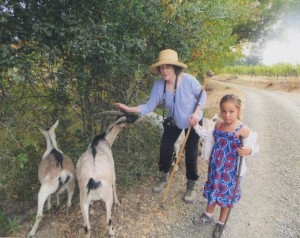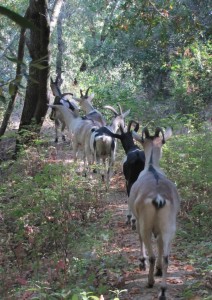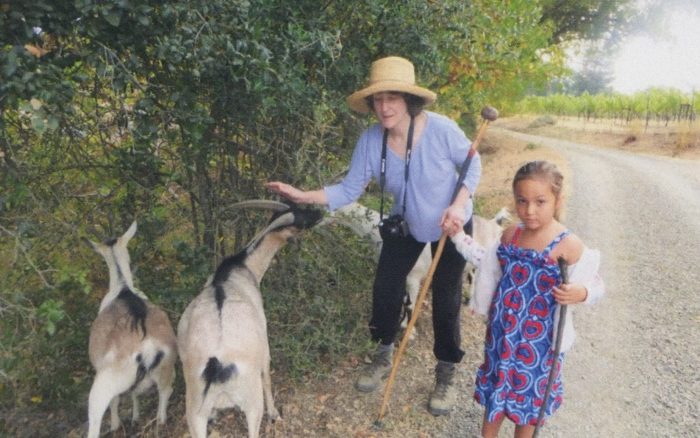 |
| When you are short, it is important to stick close to an adult! Negotiating with Dasher. |
Last month my great niece, five year old Olivia, visited with her grandmother, my sister Judy. We did the usual things when people visit: spent an afternoon on the paths through the redwood giants of Armstrong Redwoods, another walking the sandy stretch of Doran Beach collecting sand dollars the size of dimes. While Judy and I caught up on recent family events, Olivia made a house from a cardboard box for her dolls, hanging tissue paper wallpaper and drawing designs on the outside walls. We visited the California Academy of Sciences in San Francisco and were mesmerized by strange and colorful fish in the giant aquariums. But when asked what was her favorite part of the trip, Olivia said, learning to walk with the goats.
 |
| Knowing one’s place is key to a good experience. |
Walking the goats is truly an art. Most children want to run up to the goats to pet them, upon which one of two things will happen: either the goats run, thinking the child a predator, or they decide the child needs to be butted and put in his or her place! In walking with goats, you learn to pay attention to the rules of the herd: to not behave as a predator, nor forget your place and run ahead Olivia and the Goats (this will result in discipline from Dasher or Gaviota). Goats have roles and Gaviota and Dasher are the order keepers. If someone gets out of line, its their job take care of matters. If you are short, you also better stay close to a human adult. Mother goats butt the kids of others who get too close long after the kids become full grown. Probably this has to do with not wanting to nurse anyone’s kids, but the habit persists.
If humans are willing to follow these rules, it is an energizing experience to walk with the herd, the energy high, goats running, gambling, leaping onto hillsides, browsing. Like Olivia, when I think of one of my favorite times of day, it is that morning walk.
Educator Lowell Monke states a fundamental lesson of our time that has to do with survival of our species, is that of “coming to terms with the proper limits of one’s own power in relation to nature, society, and one’s own desires” (Lowell Monke, Orion, “Thoughts on American Fund”, Sept/Oct 2005). I suspect this is a lesson Olivia learned: how to not be frightened but to enjoy the goat walk by learning the rules of the goatherd. To know the limits of one’s own power in relation to nature, in this case, goats, is to be related, even at-one-with, and that experience is satisfying. It is one in which we are not in-dominion-over but in-relationship-with. Maybe it is the lesson of 2012— and beyond— for all of us, key to mitigating our impact on dear planet Earth.
